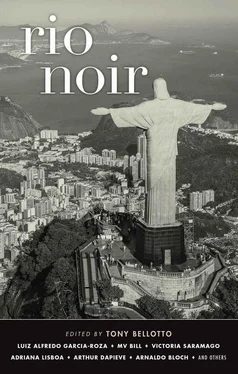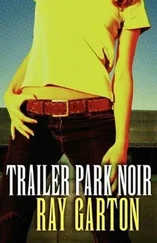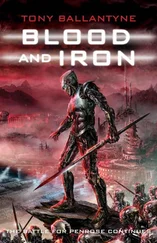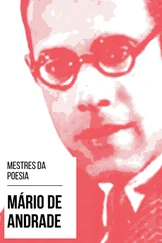Tony Bellotto - Rio Noir
Здесь есть возможность читать онлайн «Tony Bellotto - Rio Noir» весь текст электронной книги совершенно бесплатно (целиком полную версию без сокращений). В некоторых случаях можно слушать аудио, скачать через торрент в формате fb2 и присутствует краткое содержание. Город: New York, Год выпуска: 2016, ISBN: 2016, Издательство: Akashic Books, Жанр: Детектив, на английском языке. Описание произведения, (предисловие) а так же отзывы посетителей доступны на портале библиотеки ЛибКат.
- Название:Rio Noir
- Автор:
- Издательство:Akashic Books
- Жанр:
- Год:2016
- Город:New York
- ISBN:978-1-61775-312-1
- Рейтинг книги:4 / 5. Голосов: 1
-
Избранное:Добавить в избранное
- Отзывы:
-
Ваша оценка:
- 80
- 1
- 2
- 3
- 4
- 5
Rio Noir: краткое содержание, описание и аннотация
Предлагаем к чтению аннотацию, описание, краткое содержание или предисловие (зависит от того, что написал сам автор книги «Rio Noir»). Если вы не нашли необходимую информацию о книге — напишите в комментариях, мы постараемся отыскать её.
, the Akashic Noir Series delves for the first time into South America.
Rio Noir — читать онлайн бесплатно полную книгу (весь текст) целиком
Ниже представлен текст книги, разбитый по страницам. Система сохранения места последней прочитанной страницы, позволяет с удобством читать онлайн бесплатно книгу «Rio Noir», без необходимости каждый раз заново искать на чём Вы остановились. Поставьте закладку, и сможете в любой момент перейти на страницу, на которой закончили чтение.
Интервал:
Закладка:
Rio Noir

Introduction
Deciphering an Enigma
The images of Rio de Janeiro are well known: high rises aligned along white sandy beaches, a blue sea, freshwater lakes, and luxuriant forests that stretch through winding mountains of stone; Sugar Loaf linked to the ground by cable cars in hypnotic shuttle; hang gliders crossing the sky in flights without destination; the open arms of Christ the Redeemer blessing a happy, cordial, mixed-race people ever ready to dance a samba or offer a welcoming smile to the tourists who move about in the streets admiring beautiful women shimmying nude atop floats in Carnival parades... Opa !
This is not a tourist guide. The city revealed in this book is a different Rio.
Even though famous landscapes are present in the pages of Rio Noir , what is exposed here is a world of shadows, blood, intrigue, violence, hideouts, and mystery (and also of humor, of course, as is necessary with any undertaking involving Cariocas).
Long ago, Rio ceased to be an idyllic city of tourist enchantment, and crime scenes of savage drug traffickers, violent cops, and corrupt politicians document that fact with disturbing regularity in newscasts worldwide. Nowadays, the image of the city of beautiful beaches, sensual women, lively gay people, and likable swindlers is inexorably tied to shootouts and bloody disputes between criminal factions. The divided city, fractured into a cosmopolitan middle class and a populace residing in neglected poverty-ridden communities, has become the poster child for a country of enormous social inequality and disquieting violence.
All of which holds great excitement as raw material for crime fiction!
This conclusion is paradoxical and somewhat disturbing, I admit, but is there any city more paradoxical than Rio de Janeiro?
The capital of Brazil from 1773 to 1960 — and of the entire Portuguese Empire during the Napoleonic Wars — the international symbol of the nation, the principal tourist destination of the southern hemisphere, host city of the 2016 Olympics, characterized by the highest indices of violence and poverty, Rio is much more than the city seen on postcards, in socioeconomic statistics, and shocking newspaper reports.
The city is above all an enigma in search of being deciphered.
I may sound off base in stating that no one is better suited to decipher enigmas than writers of crime stories. Among other functions, noir fiction allows exploration of the social aspects, the human strengths and weaknesses that make up the daily life of any great city.
In an effort to decipher this enigma, I invited Luiz Alfredo Garcia-Roza, MV Bill, Luiz Eduardo Soares, Guilherme Fiuza, Arthur Dapieve, Victoria Saramago, Arnaldo Bloch, Adriana Lisboa, Alexandre Fraga dos Santos, Marcelo Ferroni, Flávio Carneiro, Raphael Montes, and Luis Fernando Verissimo to join me in the creation of the anthology you are leafing through (not, I warn, without some risk of getting blood on your hands).
Choosing these authors was like climbing Sugar Loaf for the simple pleasure, after having stealthily scaled the sheer vertical rock, of gazing upon a limitless horizon. In this work, writers of both sexes skillfully move between fiction of different genres, journalism, humor, horror, philosophy, public safety, psychoanalysis, rock, rap, social and political activism, and law. Even those who had never written noir fiction were moved to tell stories that, in distinct forms and twists, present a puzzle that dares to test the limits of the genre. Whether we have succeeded in deciphering an enigma with the dramas of our procurers, card readers, colonels, cops, traffickers, socialites, slum dwellers, embezzlers, tourists, brokers, detectives, journalists, politicians, assassins, editors, outlaws, travelers, coup plotters, writers, lovers, and everyday citizens, I don’t know. But we have surely added a large shadow to the sunny landscape of this wonderful city.
Tony Bellotto
March 2016
Part I
Purgatory of Beauty & Chaos
The Hanged Man
by Adriana Lisboa
Largo do Machado
Nowadays I almost never come to Largo do Machado. The gymnastics equipment I see when I leave the subway, for example, I’m not familiar with, and I think it was put here in the square some years back. I remember having read something about it in the paper. Today, under the fine, cold rain, it appears no one is motivated to exercise. The concrete tables where I used to see old men playing checkers and cards are also unoccupied. The pigeons look for shelter wherever they can. There in the distance, haughty and sad, the church watches.
The traffic moves around the square, a sluggish flow of buses and cars, but the square itself seems strangely uninhabited beyond the irregular stream of people entering or leaving the subway station, their umbrellas challenging one another.
I miss the gypsies. In the period when I lived here they used to hang out in the square offering to read your palm or divine your future in their cards. At the time, they irritated me. Today I feel they would provide me a certain comfort, as proof that my past didn’t totally unravel.
I very rarely come by here. Currently we live in Recreio and our life is there, my work and my wife’s, the children’s school. Before that, there was the long stay in Belo Horizonte. But in the 1980s I lived near here in a two-room apartment on Rua Bento Lisboa. Those weren’t easy times, and I was right to take the job in Belo Horizonte.
I think about going by my old building to see what has changed in the decades since — in this city some things have begun changing with such treacherous speed that I sometimes can’t keep up with it. But I don’t, because of the rain. Distracted, I step in a puddle, soaking my foot. Shit.
Remembering the gypsies takes me back to my girlfriend in those days, Simone, who was interested in tarot. I always considered that kind of thing utter foolishness, but even so there was a homey comfort in seeing her take out the deck from its old box, shuffle the cards, place some on the table — turning them this way and that. There were some curious images. From time to time she would raise her eyes from the cards and observe me obliquely. But whatever the cards told her about me, it was without my approval.
Simone claimed to have gypsy ancestors. I don’t know if she actually did. She was a bit crazy, to tell the truth. “Ask your cousins to stop bothering people in Largo do Machado,” I once told my alleged gypsy.
“They’re not my cousins,” she replied.
Ours was an unhappy story. We didn’t part on good terms. I take my share of responsibility, but Simone was excessively dramatic. Everything was serious, everything was yes or no, black or white, she recognized no in-between. I learned, years later, of her death in an automobile accident. It apparently happened shortly after our breakup. She was so young. I don’t usually revisit that topic, it pains me, but returning to Largo do Machado (we used to go to the Portuguese wine cellar, and we would have sfihas and tabouli at the Arab’s in the Condor Gallery; sometimes Simone would buy Indian skirts at the Meu Cantinho boutique) knots something in my heart.
The rain gets heavier. My wet sock bothers me. I wait until I make it to the building where I have to take the documents. I could handle the matter of the documents another way, but I’m up for promotion at the end of the year and until then have to suck up to the boss. I sit on a bench in the reception area, take off the shoe and sock, wring out the sock, and put it back on. My foot is still wet, but at least now it doesn’t sink into a puddle of water with each step. The building’s doorman watches me.
Читать дальшеИнтервал:
Закладка:
Похожие книги на «Rio Noir»
Представляем Вашему вниманию похожие книги на «Rio Noir» списком для выбора. Мы отобрали схожую по названию и смыслу литературу в надежде предоставить читателям больше вариантов отыскать новые, интересные, ещё непрочитанные произведения.
Обсуждение, отзывы о книге «Rio Noir» и просто собственные мнения читателей. Оставьте ваши комментарии, напишите, что Вы думаете о произведении, его смысле или главных героях. Укажите что конкретно понравилось, а что нет, и почему Вы так считаете.












